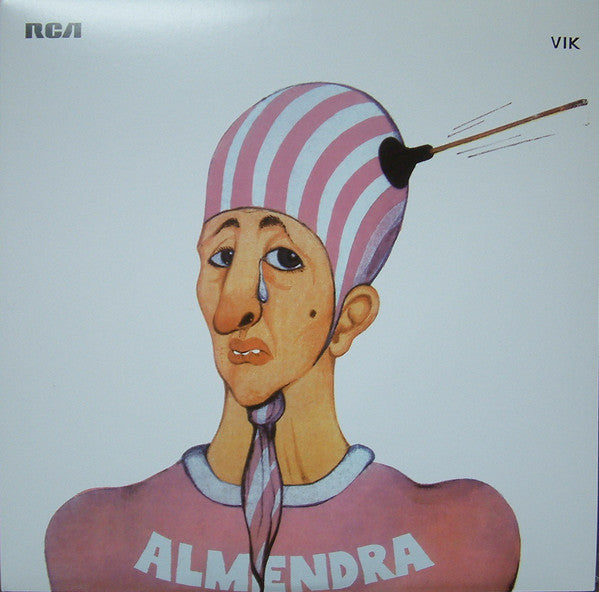Almendra - Almendra
Precio habitual
$ 1,450.00 MXN
Precio habitual
Precio de oferta
$ 1,450.00 MXN
Precio unitario
/
por
Impuesto incluido.
No se pudo cargar la disponibilidad de retiro
[i]Almendra[/i] ("Almond") was one of the most important rock and roll groups from Buenos Aires, Argentina in the late 1960s. Originally called [i]The Beatniks[/i], it was born out of a fusion of two high schools bands, [i]Los Sbirros[/i] and [i]Los Larkins[/i]. Led by guitarist and lyricist [a1006851], between 1968 and 1971 Almendra released a few singles and two albums that revolutionized the sound of Argentine rock for the remainder of the 20th century.
By 1967 the formation that would become Almendra, [a=Rodolfo Garcia] (Drums), [a=Luis Alberto Spinetta] (Vocals), Santiago Novoa (Keyboards), [a=Emilio del Guercio] (Bass) and [a=Edelmiro Molinari] (Guitar) was ready, but Rodolfo was drafted into military service and the band sat out for the rest of the year. During that time [a=Tanguito]'s [i]La Balsa[/i], played by [i][a=Los Gatos][/i], became a massive hit, paving the way for Argentine Rock. The same year, upon hearing the news of the death of a friend, Spientta composed [i]Tema de Pototo[/i], song which would later spearhead the group's ascend to fame. Eventually he would learn that his friend wasn't dead.
On march 68 Spinetta bought a guitar and the band rigorous practice sessions, prompting Novoa to leave the band. They would later change go through different names, ultimately landing on Almendra.
In 1968, upon being noticed by a Talent chaser Almendra would release their first single, [b]Tema de Pototo / El Mundo Entre las Manos[/b]. Their second live show at [i]Teatro del Globo[/i] was recorded and released on 2004 by [i]Pagina12[/i]
In 1969 the group would release [b] Hoy Todo Hielo La Ciudad / Campos Verdes [/b] and [b]Tema de Pototo / Final[/b]. "Final" was meant to be the closing song of Almendra, but wasn't due to time constraints on the LP.
Between 1969 and 1970 they recorded and released [b]Almendra[/b]. The album received mixed reviews, which caused Spinetta to distrust the media.
Almendra was followed by an abortive attempt to compose an Opera Rock with most big players of the era, the project failed due to the group's abandonment of their rigorous practice sessions. This would be the beginning of the end for the group as the members began to disagree on what musical direction to take the band. That same year they released another self-tittled album, known as [b]Almendra II[/b]. Soon after the band broke up, at the zenith of their fame. However, Edelmiro pointed out during an interview, "[i]Almendra no se divide, se multiplica[/i]" (Almendra does not divide, it multiplies).
Each member would form a band of their own. Spinetta tried to start a group called [i]Torax[/i] with Molinari, however, it failed and he traveled to Europe and composed a soloist album, to return later and form [a=Pescado Rabioso]. Meanwhile Molinari would start [i][a=Color Humano][/i] and Emilio Del Guercio and Rodolfo Garcia [i][a=Aquelarre][/i].
Almendra would reunite on 1979 and play on various shows, the unexpected appeal of the band led them to release the live Albums [b]Almendra en Obras I and II[/b] their third studio album, [b]El Valle Interior[/b] in 1980. However the group broke up again due to differences between Spinetta and Del Guercio.
On 2004 Magazine Pagina/12 released an Almendra 2 CD special containing [b]Almendra en Obras I y II[/b] and [b]Almendra En Vivo en Treatro del Globo[/b]
Almendra would have one last reunion in 2009 when Spinetta he played with in the concert [i]Spinetta y las Bandas Eternas[/i] ("Spinetta and the Eternal Bands")
Released: 2015
Label: Sony Music
Country: Argentina
Tracklist
| A1 | Muchacha (Ojos De Papel) | |
| A2 | Color Humano | |
| A3 | Figuración | |
| A4 | Ana No Duerme | |
| B1 | Fermin | |
| B2 | Plegaria Para Un Niño Dormido | |
| B3 | A Estos Hombres Tristes | |
| B4 | Que El Viento Borro Tus Manos | |
| B5 | Laura Va |
Share


